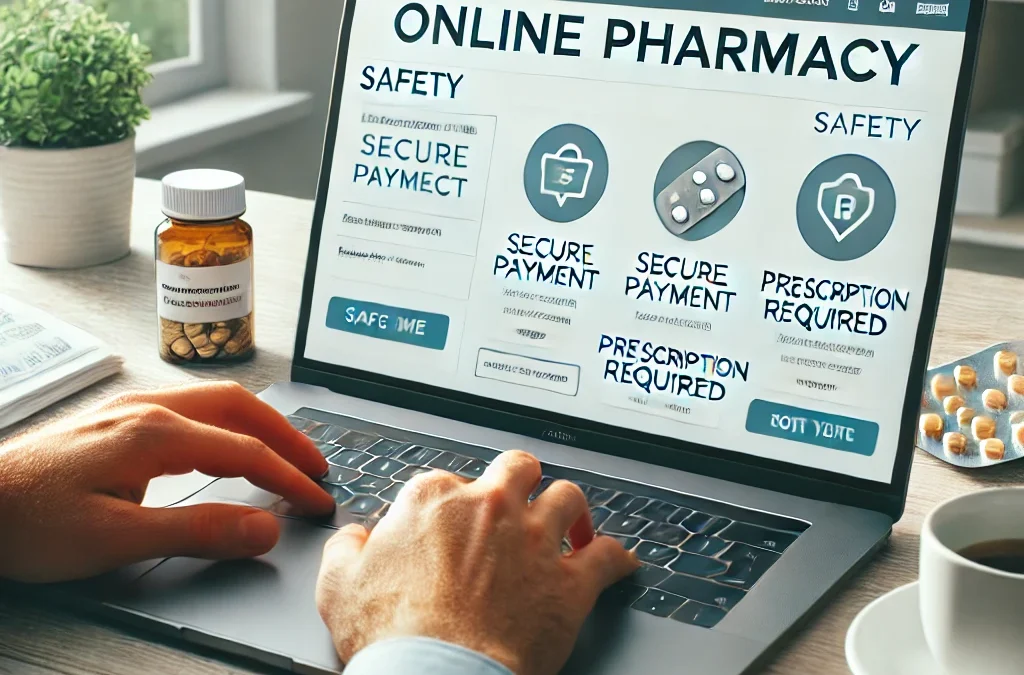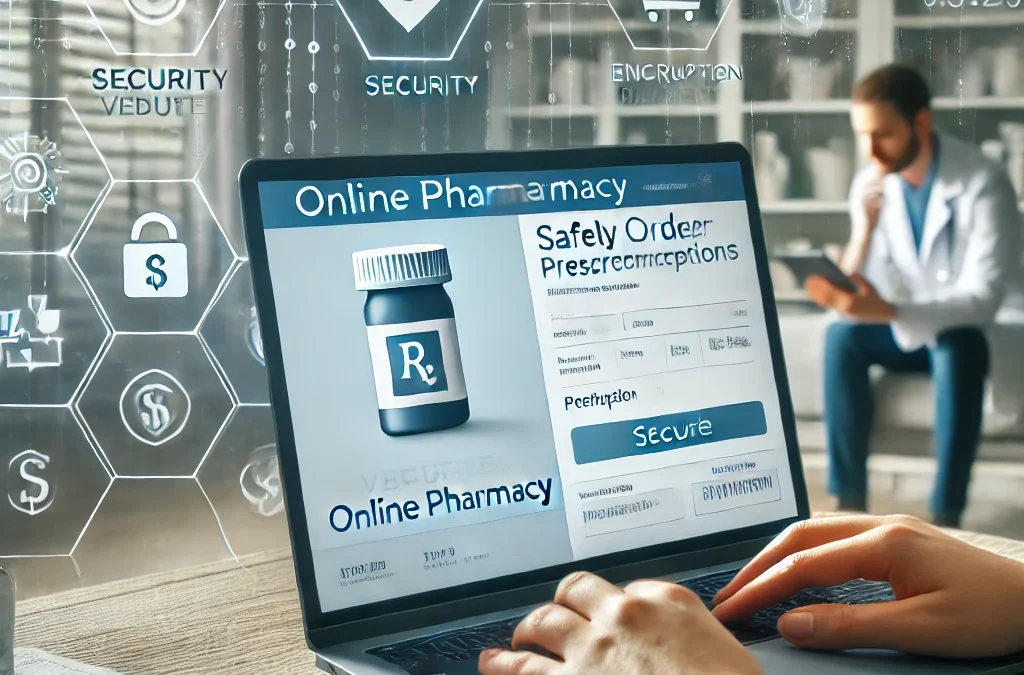
by Rich Benvin | Mar 10, 2024 | Mail Order Pharmacy
10 Questions to Ask Before Ordering Medications Online
With the increasing popularity of online pharmacies, it’s easier than ever to order prescription medications from the comfort of your home. However, before you click “buy,” it’s essential to ensure you’re dealing with a safe, legitimate, and trustworthy pharmacy. Asking the right questions can help protect your health and ensure you’re making informed decisions. Here are 10 questions to ask before ordering medications online:
1. Is the Pharmacy Licensed and Accredited?
The most critical factor in determining whether an online pharmacy is legitimate is checking its licensing and accreditation. In the U.S., look for accreditation from the National Association of Boards of Pharmacy (NABP) or its VIPPS (Verified Internet Pharmacy Practice Sites) certification. If the pharmacy is not licensed or accredited, it’s a significant red flag.
2. Do They Require a Prescription from a Licensed Doctor?
A legitimate online pharmacy will always require a valid prescription from a licensed healthcare provider. If a website offers to sell you prescription drugs without a prescription, it is likely not a safe or legitimate source. Avoid any pharmacy that makes it easy to obtain medication without proper medical evaluation.
3. Is There Access to Licensed Pharmacists?
A reputable online pharmacy will provide access to licensed pharmacists who can answer your questions about medications, potential side effects, and drug interactions. Look for a pharmacy that offers clear ways to contact a pharmacist, either through phone, chat, or email.
4. What Are the Pharmacy’s Privacy and Security Policies?
Your personal health and financial information should always be protected when ordering medications online. Verify that the website uses encryption (look for “https” in the URL) and has clear privacy and security policies in place. Never trust a pharmacy that doesn’t explicitly state how they safeguard your information.
5. Are the Prices Too Good to Be True?
If the prices seem unusually low, it might be a sign that the pharmacy is selling counterfeit or substandard medications. While online pharmacies can offer savings, particularly for generic medications, beware of prices that are far below the market average. It’s essential to strike a balance between affordability and safety.
6. How Are Medications Packaged and Delivered?
Ask about the pharmacy’s delivery process. Legitimate pharmacies will use secure, discreet packaging to ensure that your medications arrive in good condition and are handled with care. Additionally, confirm that they offer tracking information so you can monitor the status of your delivery.
7. Does the Pharmacy Offer Generics and Brand Name Options?
Many online pharmacies provide both generic and brand-name medications. If you prefer one over the other, it’s important to ask what options are available. Generics can be a cost-effective alternative, but always confirm that the generic versions offered are FDA-approved.
8. What Is Their Return and Refund Policy?
Most pharmacies do not allow returns on prescription medications for safety reasons. However, a trustworthy pharmacy should still have a clear policy on refunds or exchanges in case of incorrect shipments, damaged packages, or other issues. Make sure you understand the process before placing an order.
9. Are There Reviews or Testimonials from Other Customers?
Customer reviews can provide valuable insight into the reliability of an online pharmacy. Look for feedback on the pharmacy’s service, delivery speed, customer support, and medication quality. Be cautious of websites with overwhelmingly positive or excessively negative reviews, and consider using independent review sites for unbiased opinions.
10. Can I Confirm the Source of the Medications?
Legitimate online pharmacies should clearly state where their medications are sourced from and whether they are FDA-approved or meet local regulatory standards. If the pharmacy doesn’t disclose where its medications come from or provides vague information, this could be a warning sign that they’re selling counterfeit drugs.
Conclusion
Ordering medications online can save you time and money, but it’s essential to do your due diligence before making a purchase. By asking these 10 questions, you can protect yourself from counterfeit drugs, identity theft, and unsafe practices. Always prioritize your safety and health, and don’t hesitate to consult with your healthcare provider before making any decisions about ordering prescription medications online.

by Rich Benvin | Feb 22, 2024 | Prescription Drugs
How to Safely Order Prescription Drugs Online: A Complete Guide
With the rise of online pharmacies, buying prescription medications from the comfort of your own home has never been easier. However, with convenience comes the responsibility of ensuring that the medication you’re purchasing is safe, authentic, and legally dispensed. Ordering prescription drugs online can be a great way to save time and money, but it’s important to follow the proper steps to avoid counterfeit drugs, identity theft, and other risks associated with unreliable sources.
This guide will walk you through the process of safely ordering prescription drugs online, helping you navigate the landscape of online pharmacies while protecting your health and financial information.
1. Ensure the Pharmacy is Licensed and Accredited
The first and most crucial step in safely ordering prescription drugs online is to ensure the pharmacy is licensed and accredited. In the U.S., you can check whether an online pharmacy is legitimate by looking for certification from the National Association of Boards of Pharmacy (NABP). They offer the VIPPS (Verified Internet Pharmacy Practice Sites) accreditation, which indicates that the pharmacy complies with regulatory standards.
Look for an NABP seal or check the NABP’s website for a list of accredited pharmacies. In Canada, pharmacies should be licensed by their provincial regulatory authorities. For other countries, similar oversight bodies exist, so it’s important to verify that the online pharmacy meets local regulations.
Red Flags to Watch Out For:
- The pharmacy offers to sell prescription drugs without requiring a prescription.
- Prices seem too good to be true.
- The website lacks contact information or an option to speak with a licensed pharmacist.
- The pharmacy is based in a country with lax drug regulations.
2. Only Purchase from Pharmacies that Require a Prescription
A legitimate online pharmacy will always require a valid prescription from a licensed healthcare provider. If a website offers to sell you prescription drugs without a prescription or provides an “online consultation” that seems too informal, it’s a sign that the pharmacy may not be reputable.
Avoid websites that sell medications based on a simple questionnaire or offer to write you a prescription without a proper medical evaluation. These practices are not only illegal in many jurisdictions, but they can also put your health at serious risk.
3. Verify the Pharmacy’s Contact Information
Before ordering any medications, make sure the online pharmacy has a verifiable physical address and phone number. Reliable pharmacies will display this information clearly on their website. This allows you to contact them if there are any issues with your order or if you need to speak to a licensed pharmacist.
If you have concerns, call the pharmacy’s contact number and ask to speak with a pharmacist. Reputable pharmacies will provide easy access to professional advice and customer support. If the pharmacy is difficult to reach or avoids answering your questions, it’s best to look elsewhere.
4. Understand Your Medication and Its Risks
When purchasing prescription drugs online, make sure you fully understand the medication you’re buying. This includes the correct dosage, potential side effects, and any interactions with other drugs or health conditions you may have.
Before ordering, consult with your healthcare provider to ensure the drug is appropriate for you. Many online pharmacies offer access to licensed pharmacists who can answer your questions and provide additional guidance. Don’t hesitate to take advantage of these resources to ensure you are making an informed decision.
5. Look for Security Measures and Payment Safety
When ordering prescription drugs online, it’s important to protect your financial and personal information. Look for pharmacies that use encrypted websites (you’ll see “https” in the address bar) and secure payment methods.
Reputable pharmacies will never ask you to send payment via wire transfer, cryptocurrency, or other risky methods. Stick to credit cards or other payment options that offer consumer protection in case of fraud or disputes.
6. Check for Online Reviews and Customer Feedback
Reading online reviews can give you insight into the experiences of other customers with a particular pharmacy. While it’s always important to take reviews with a grain of caution, they can help you identify potential red flags such as late deliveries, poor customer service, or issues with medication quality.
Look for reviews from trusted sources, such as independent websites or consumer protection organizations. If a pharmacy has overwhelmingly negative feedback or numerous reports of fraud, avoid making any purchases from them.
7. Beware of Counterfeit Medications
Counterfeit drugs are a significant issue in the world of online pharmacies. These medications may look identical to the real thing, but they can contain harmful or ineffective ingredients, putting your health at risk. To avoid counterfeit drugs, always purchase from a licensed and accredited pharmacy.
Signs of Counterfeit Drugs:
- Unusual packaging or labeling errors.
- Pills that look different from what you normally receive.
- Sudden unexpected side effects.
If you suspect that a medication you received is counterfeit, contact your healthcare provider immediately and report the issue to regulatory authorities such as the U.S. Food and Drug Administration (FDA).
8. Check for Proper Delivery Practices
Legitimate online pharmacies will have secure, reliable shipping options for delivering your prescription drugs. They will also package the medications discreetly and provide tracking information so you can monitor the progress of your order.
Make sure to inquire about the pharmacy’s shipping policies, including delivery times and how they handle temperature-sensitive medications. For example, certain medications need to be stored at specific temperatures during transit, so it’s important to confirm that the pharmacy has proper protocols in place to ensure the safety and efficacy of your medications.
9. Know the Pharmacy’s Return and Refund Policy
Before placing an order, familiarize yourself with the pharmacy’s return and refund policy. While prescription medications are typically non-returnable due to safety regulations, a reliable pharmacy should offer clear policies regarding refunds for damaged or incorrect orders.
If a pharmacy lacks clear policies or refuses to provide refunds for mistakes, this is a red flag.
10. Consult with Your Doctor or Pharmacist Regularly
Even when ordering medications online, it’s essential to maintain an open line of communication with your healthcare provider. Regularly check in with your doctor or pharmacist to ensure that your prescriptions are up-to-date and that the medication is still appropriate for your health condition.
This ongoing relationship will also help catch any potential issues with your online medication orders, including incorrect dosages or drug interactions.
Conclusion
Ordering prescription drugs online can offer significant convenience and savings, but it’s essential to prioritize your safety and well-being. By following these steps—choosing a licensed pharmacy, verifying prescriptions, protecting your personal information, and avoiding counterfeit drugs—you can confidently navigate the world of online pharmacies. Always be cautious, and when in doubt, consult with a licensed healthcare professional to ensure you’re making the right choices for your health.



